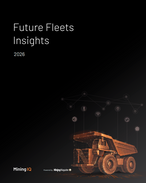This article is 5 years old. Images might not display.
Mining Magazine is making some of its most important coverage of the COVID-19 pandemic freely available to readers. For more coverage, please see our COVID-19 hub. To subscribe to Mining Magazine, click here.
Vale said it would advance payments to small and medium-sized companies in Brazil for services or materials already delivered, reduce payment terms for services and materials still to be invoiced by up to 85%, and provide financial support to construction companies and workers at idled projects.
Executive officer of global business support Alexandre Pereira said: "At a time when the country is experiencing great uncertainty, we will use our distribution network, our presence at the base of the production chain and our capacity of mobilisation to help our suppliers face the impacts of this pandemic, always focusing on the health and safety of people."
On March 20, the miner confirmed two cases of COVID-19 among its workers in Minas Gerais and Rio de Janeiro, Brazil. It said it had communicated the cases to authorities and that the employees were in domiciliary isolation and doing well.
In the coming weeks, Vale is installing 81 thermal cameras at the entrances of its Brazilian facilities to identify people with high body temperatures, one of the symptoms of COVID-19. The first batch of equipment will arrive in Belo Horizonte by the end of March; the cameras will then be distributed to other states.
The company has implemented remote working for employees eligible to work from home and those in risk groups.

On Friday, Chinese company Wondfo delivered a batch of rapid test kits for the new coronavirus to Vale China. These 500,000 units were then flown from Guangdong province to São Paulo, arriving on Monday night, while another 4.5 million units will be delivered in April. Vale is donating the kits to help the Brazilian government fight the spread of the disease in the country.
Vale has also launched a public challenge aimed at finding ways to reduce the impact of the pandemic on society.
As part of the initiative, in collaboration with Brazil hospitals Hospital Israelita Albert Einstein and Rede Mater Dei de Saúde, the company is offering direct investment of US$1 million or in-kind support via partners to speed implementation of a winning idea.
























